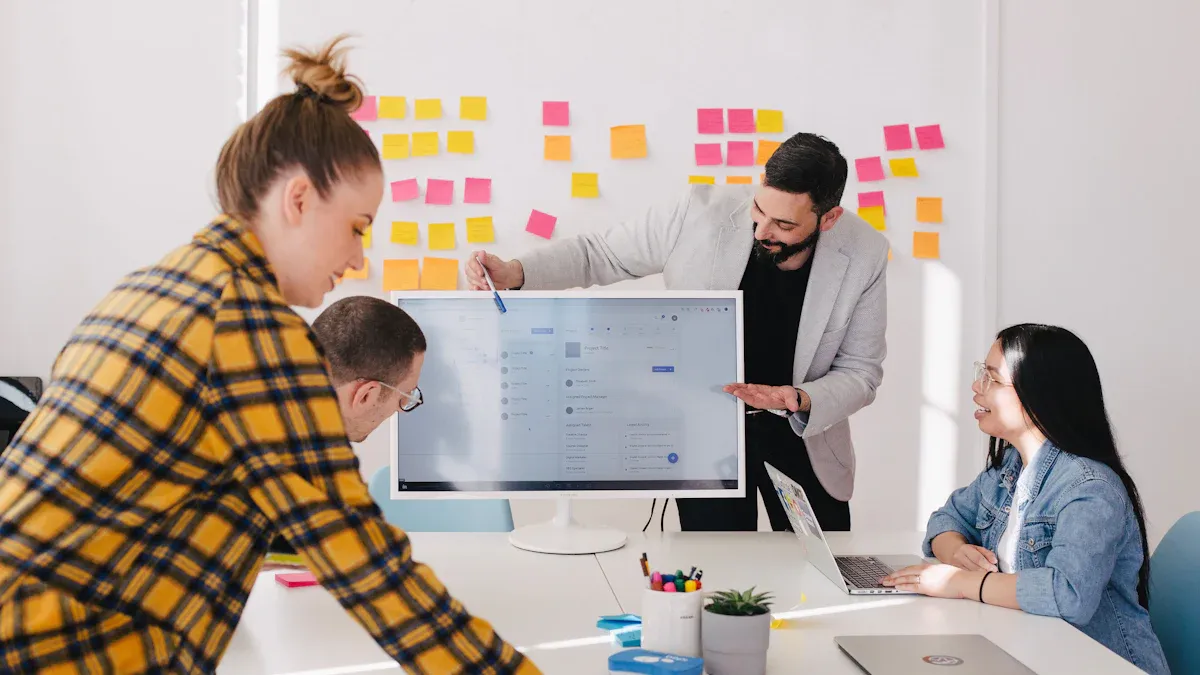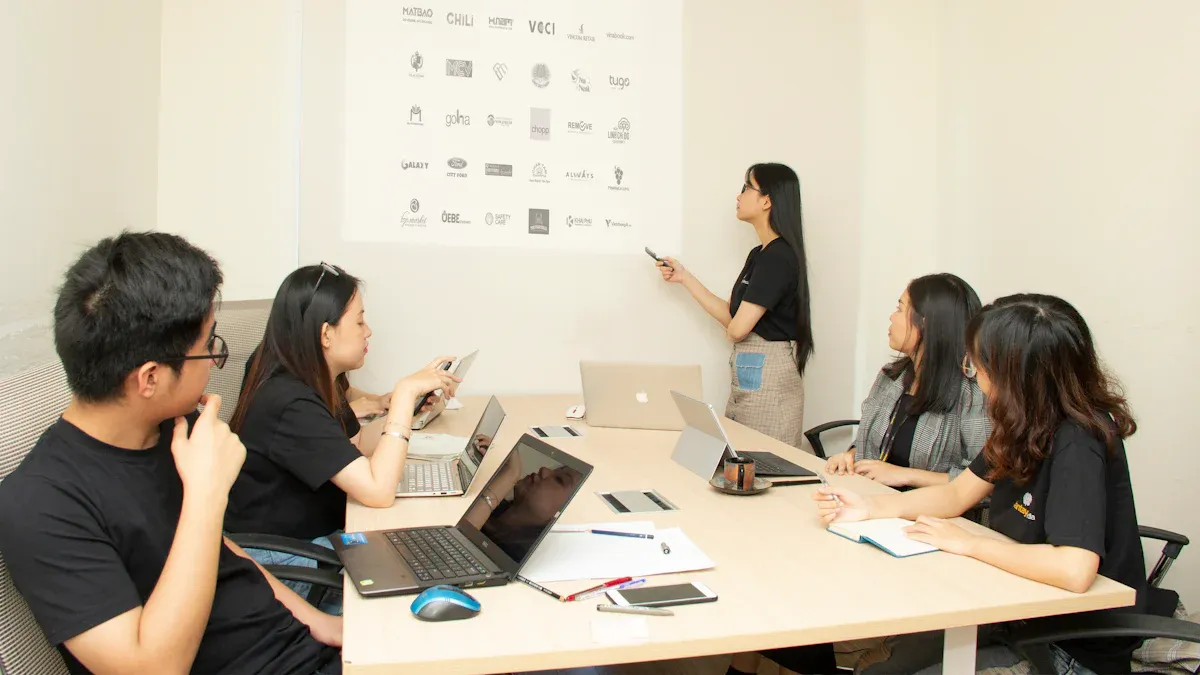How Personalized Learning Drives Employee Career Success

Personalized learning transforms how you grow in your career by focusing on your unique strengths and aspirations. It empowers you to unlock your full potential through tailored learning experiences that align with your goals, including Adaptive Employee Growth Pathways. Companies like Salesforce and Unilever have seen remarkable results, including a 44% boost in engagement and higher retention rates, by adopting personalized learning systems. Adaptive learning technologies, such as Axonify, ensure workplace learning remains relevant and effective by continuously adjusting to your needs. This approach not only accelerates your development but also fosters a deeper connection to your role and organization.
Key Takeaways
Personalized learning focuses on your strengths and goals. It helps you grow faster and better.
Companies using personalized learning see happier workers who stay longer. This builds a loyal team.
Smart learning tools give quick feedback and change lessons for you. This keeps you interested and excited to learn.
Personalized training improves your skills and makes you important to your company.
A learning culture helps workers control their growth. This leads to more job happiness and loyalty.
What Is Personalized Learning and Why Does It Matter?
Defining Personalized Learning
Personalized learning tailors your educational experience to your unique needs, goals, and preferences. It moves away from a one-size-fits-all approach and focuses on what works best for you. This method uses several key components to create a customized learning journey:
Learner profiles capture your interests, learning style, and goals.
Learning objectives ensure your progress aligns with measurable outcomes.
Flexible content like videos, simulations, and interactive tools keeps learning engaging.
Data-driven instruction adjusts your learning path based on your progress.
Collaborative learning fosters teamwork through group projects and peer feedback.
These elements work together to create a learning experience that feels relevant and empowering. Personalized learning helps you stay motivated and achieve your career aspirations faster.
The Connection Between Personalized Learning and Career Success
When learning aligns with your career goals, success becomes more attainable. Personalized learning equips you with the skills you need to excel in your role and prepares you for future opportunities. By focusing on your strengths and addressing skill gaps, it accelerates your professional development.
This approach also builds confidence. As you master new skills, you feel more capable of taking on challenges. Over time, this confidence translates into better performance and recognition in your workplace. Personalized learning doesn’t just help you grow; it positions you as a valuable asset to your organization.
Why Personalized Learning Is Essential in Today’s Workplace
Modern workplaces demand adaptability and continuous learning. Personalized learning meets these demands by giving you control over your educational journey. You can choose what to learn and how to learn it, keeping you engaged and motivated.
This approach also improves information retention. When you actively engage with content that resonates with you, it sticks. Additionally, personalized learning saves time by focusing only on what you need, making it a practical solution for busy professionals.
Incorporating adaptive learning technologies into the workplace ensures that learning remains relevant and effective. By embracing personalization, organizations create a culture of growth that benefits both you and the business.
Key Benefits of Personalized Learning for Employees

Accelerated Skill Development
Personalized learning experiences help you develop skills faster by focusing on what you need most. Instead of wasting time on irrelevant material, you can dive straight into targeted content that aligns with your goals. This approach ensures you gain practical knowledge and apply it immediately to your role.
With adaptive learning technologies, your progress is continuously monitored, and your learning path adjusts to match your pace. This keeps you engaged and motivated to improve. For example, companies like IBM have implemented personalized learning systems that boost employee performance by tailoring training to individual needs. As a result, employees feel more confident and capable in their roles.
By embracing upskilling through personalized learning, you can stay ahead in your career. Whether you're mastering new tools or refining existing skills, this method ensures you're always prepared for the next challenge.
Enhanced Career Progression Opportunities
Personalized learning opens doors to career advancement by equipping you with the skills needed for higher-level roles. When your learning journey aligns with your career aspirations, you can achieve your goals faster.
Salesforce's myTrailhead platform allows employees to create customized learning paths. This led to a 44% increase in engagement and higher productivity.
WorkSmart's personalized learning program resulted in a 40% rise in employee engagement and a 25% drop in turnover rates within a year.
RetailPlus saw its Net Promoter Score jump from 20 to 50 after introducing an AI-driven learning platform.
These examples highlight how personalized learning experiences empower employees to grow within their organizations. By focusing on skills development, you can position yourself as a valuable asset and unlock new opportunities for growth.
Increased Job Satisfaction and Engagement
When you feel supported in your development, your job satisfaction soars. Personalized learning fosters a sense of accomplishment by addressing your unique needs and goals. This approach not only enhances your skills but also strengthens your connection to your role.
Company | Impact on Engagement/Satisfaction | Percentage Increase |
|---|---|---|
Salesforce | Significant increase in engagement | 44% |
Unilever | Stronger commitment to roles | 87% |
Netflix | Greater job satisfaction | 76% |
IBM | Increased competence feeling | 50% |
MasterCard | Increase in satisfaction | 30% |
Coca-Cola | Reduction in turnover | 25% |
These results show how personalized learning experiences improve employee engagement and satisfaction. By investing in your growth, organizations create a culture of continuous learning that benefits everyone.
Improved Retention and Loyalty to Organizations
When you feel valued and supported in your growth, you’re more likely to stay with your organization. Personalized learning plays a key role in improving employee retention by addressing your unique development needs. It creates a sense of belonging and purpose, which strengthens your loyalty to your workplace.
Organizations that invest in your development show they care about your future. This commitment fosters trust and motivates you to contribute your best. For example, companies that implement adaptive learning platforms often see a significant reduction in turnover rates. These platforms ensure your learning journey aligns with your career goals, making you feel more connected to your role.
A culture of continuous learning also boosts retention. When you have access to tailored learning opportunities, you’re more likely to stay engaged and committed. This approach not only helps you grow but also ensures you feel supported every step of the way. Studies reveal that employees who experience personalized learning are 50% more likely to remain with their organizations long-term.
Tip: Look for organizations that prioritize your growth through personalized learning. These companies often have higher employee satisfaction and retention rates.
By focusing on your individual needs, personalized learning transforms your workplace experience. It builds a strong foundation of trust and loyalty, ensuring you thrive in your career while contributing to your organization’s success.
The Role of Technology in Enabling Adaptive Learning
How Adaptive Learning Platforms Work
Adaptive learning platforms revolutionize how you approach training by tailoring programs to your unique needs. These platforms use advanced technologies like AI and data mining to analyze your performance and preferences. They then create customized learning paths that help you achieve your goals faster.
You begin with assessments that identify your strengths and areas for improvement.
AI-driven recommendations guide you to the most relevant learning materials.
Real-time feedback keeps you informed about your progress and highlights areas needing extra attention.
This process ensures you master skills effectively while staying engaged. By focusing on your specific needs, adaptive learning platforms optimize training outcomes and make your development journey more efficient.
Leveraging Data to Create Adaptive Employee Growth Pathways
Data analytics plays a crucial role in shaping adaptive employee growth pathways. By analyzing your performance data, organizations can identify skill gaps and design tailored training programs. This approach not only boosts your productivity but also prepares you for the future of workforce development.
Evidence Type | Description |
|---|---|
Survey Result | 79% of executives believe organizations must adapt workforce strategies for digital transformation. |
Case Study | Netflix uses predictive analytics for tailored development plans, resulting in a 40% boost in employee performance. |
As automation reshapes industries, companies that leverage data to adapt their workforce strategies will lead the way. For example, a tech company increased productivity by 40% after using analytics to customize training programs. These insights ensure your learning aligns with both your career goals and organizational needs.
Examples of Tools and Technologies Supporting Workforce Development
Several tools and technologies are transforming workforce development through adaptive learning. These innovations focus on personalization, efficiency, and scalability to meet your evolving needs.
Personalization tailors training to your learning style and knowledge gaps.
Efficiency removes unnecessary content, saving you time.
Scalability adapts programs to match organizational changes.
Data-driven insights provide actionable feedback for you and your managers.
Platforms like Axonify and Degreed exemplify how technology supports continuous learning. They empower you to stay ahead in your career by offering tailored solutions that grow with you. These tools ensure workforce development remains relevant and impactful, preparing you for the challenges of tomorrow.
How Organizations Can Implement Personalized Learning Strategies
Steps to Leverage Employee Data Effectively
Using employee data effectively can transform how you approach personalized learning. By analyzing data, you can identify skill gaps, align training with business goals, and create impactful learning experiences. Here’s how you can get started:
Collaborate with department leaders to align learning objectives with team goals.
Build a skill inventory to map out the competencies required for each role.
Conduct assessments to uncover employee strengths and areas for improvement.
Engage managers to provide insights into team dynamics and individual needs.
Use adaptive learning platforms to personalize training based on real-time data.
A McKinsey study found that companies adopting data-driven training saw a 40% boost in engagement and performance. For example, IBM’s personalized learning paths improved retention rates by 22%. By leveraging data, you can ensure every employee receives the support they need to thrive.
Designing Tailored Learning Paths for Employee Development
Creating personalized learning paths starts with understanding your employees’ unique needs. Align these with your organization’s objectives to ensure mutual growth. To design effective learning paths:
Set SMART (Specific, Measurable, Achievable, Relevant, Time-bound) learning goals.
Offer diverse resources like online courses, peer collaborations, and coaching.
Provide continuous feedback to refine and improve the learning experience.
Tailored learning paths empower employees to take charge of their development. This approach not only enhances their skills but also prepares them for future challenges. By focusing on individual growth, you can build a workforce ready to adapt and excel.
Fostering a Culture of Continuous Learning
A culture of continuous learning inspires employees to grow and innovate. To foster this mindset, you need to integrate learning into daily work life. Here are some best practices:
Encourage employees to embrace a growth mindset.
Provide access to a variety of learning tools and resources.
Allocate time for learning during work hours.
Promote collaboration and knowledge sharing among teams.
Recognize and reward employees who actively pursue development.
When learning becomes a continuous process, employees feel supported and motivated. This culture not only boosts individual performance but also drives organizational success. By aligning learning programs with business goals, you can create a future-ready workforce equipped to handle any challenge.
Measuring the Impact of Adaptive Learning Initiatives
Measuring the success of adaptive learning initiatives ensures you understand their value and effectiveness. By tracking the right metrics, you can evaluate how these programs contribute to employee growth and organizational success. Here’s how you can assess their impact:
Track Skill Development Progress
Monitor how employees improve their skills over time. Use pre- and post-training assessments to measure knowledge gains. This data shows whether the learning initiatives address skill gaps effectively.Evaluate Employee Engagement
High engagement levels indicate that employees find the learning process meaningful. Track participation rates, completion rates, and feedback scores to gauge how well the program resonates with your team.Measure Career Advancement
Look at how adaptive learning influences career progression. Analyze promotion rates, internal mobility, and the number of employees taking on new responsibilities. These metrics highlight the program’s role in preparing employees for growth.Assess Retention Rates
Employees who feel supported in their development are more likely to stay. Compare retention rates before and after implementing adaptive learning. A positive trend reflects the program’s success in fostering loyalty.Monitor Business Outcomes
Link learning initiatives to business performance. Metrics like productivity, customer satisfaction, and revenue growth can reveal how employee development impacts organizational goals.
Tip: Regularly review these metrics to refine your adaptive learning strategies. Continuous learning thrives when you adapt to feedback and evolving needs.
By focusing on measurable outcomes, you can ensure your learning initiatives drive meaningful results. This approach not only supports employee development but also strengthens your organization’s future.
Real-World Examples of Personalized Learning Success

Case Study: IBM’s Use of Adaptive Learning Platforms
IBM has set a benchmark in employee development by leveraging adaptive learning platforms. These platforms create personalized learning paths tailored to individual needs, ensuring every employee receives relevant training. Real-time feedback keeps you engaged and helps you track your progress effectively.
IBM’s approach also saves time by allowing you to skip familiar content and focus on areas where you need improvement. Advanced learners can fast-track their training, making the process efficient and rewarding. The scalability of these platforms ensures seamless implementation across the organization, benefiting employees at all levels.
Data-driven insights play a pivotal role in IBM’s strategy. By analyzing performance metrics, the company refines its training programs to maximize effectiveness. This focus on analytics not only enhances employee performance but also informs decision-making at a strategic level.
Success Stories of Employees Advancing Their Careers Through Adaptive Learning
Adaptive learning has transformed the careers of countless employees. Imagine starting a new role and feeling overwhelmed by the skills you need to master. With personalized learning, you can focus on what matters most, building confidence and competence along the way.
For example, a retail associate used an adaptive learning platform to improve customer service skills. Within months, they earned a promotion to team leader. Another employee in the tech industry leveraged personalized training to master advanced coding techniques, leading to a role in software development.
These stories highlight how adaptive learning empowers you to take charge of your growth. By addressing your unique needs, this approach helps you achieve career milestones faster and with greater confidence.
Lessons Learned From Organizations Embracing Workforce Development Strategies
Organizations that prioritize workforce development have uncovered valuable lessons. Collaboration stands out as a key factor. Successful programs often involve partnerships between public, private, and nonprofit sectors. This collective effort ensures long-term success and sustainability.
Effective communication is another critical takeaway. When employers and employees engage in open dialogue, training programs align better with real-world needs. This alignment ensures that you gain skills relevant to the evolving job market.
By fostering collaboration and maintaining clear communication, organizations create development strategies that benefit everyone. These lessons serve as a roadmap for companies looking to invest in their employees’ future.
Personalized learning transforms your career by addressing your unique needs and goals. It empowers you to grow faster, achieve mastery, and feel more connected to your role. Organizations that embrace this approach see remarkable results.
Salesforce achieves a 95% retention rate through personalized engagement strategies.
Companies with tailored training programs experience a 46% drop in turnover.
94% of employees stay longer when their career development is prioritized.
Investing in adaptive learning technologies creates long-term benefits. These tools ensure you master objectives, save time, and align learning with business outcomes. Organizations adopting this strategy are 53% more likely to grow. By fostering continuous learning, businesses build thriving environments that attract top talent and drive success.
Take Action: Advocate for personalized learning in your workplace. It’s the key to unlocking your potential and shaping a brighter future for both you and your organization.
FAQ
What is adaptive learning, and how does it benefit employees?
Adaptive learning uses technology to tailor learning experiences to your unique needs. It helps you focus on areas that need improvement, making your development faster and more effective. This approach ensures you gain relevant skills while staying engaged in your personalized training journey.
How does personalized training improve career growth?
Personalized training aligns with your career goals, helping you acquire the skills needed for advancement. By addressing your specific needs, it accelerates upskilling and reskilling, making you more confident and prepared for new opportunities. This targeted approach positions you for long-term success.
Why is upskilling and reskilling important in today’s workplace?
The job market evolves rapidly. Upskilling and reskilling keep you competitive by equipping you with the latest skills. These efforts ensure you stay relevant in your role and prepared for future challenges, boosting your value as an employee and enhancing your career prospects.
How can organizations support employee development effectively?
Organizations can support your development by offering personalized training experiences. They can use adaptive learning platforms to create tailored programs, provide continuous feedback, and foster a culture of growth. These strategies help you feel valued and motivated to excel in your career.
What are the long-term benefits of personalized training for employees?
Personalized training builds confidence, enhances job satisfaction, and strengthens your connection to your role. It also improves retention by aligning your growth with organizational goals. Over time, this approach ensures you thrive in your career while contributing to your company’s success.
See Also
Improving Employee Engagement With MokaHR’s Talent Management Solutions
Boosting Employer Image With MokaHR’s Career Site Features
Discovering Talent Potential Using MokaHR’s Online Management Tools
Leveraging AI Recruitment Tools To Anticipate Candidate Performance
Achieving Recruitment Excellence Using AI Solutions: MokaHR’s Strategy
From recruiting candidates to onboarding new team members, MokaHR gives your company everything you need to be great at hiring.
Subscribe for more information

